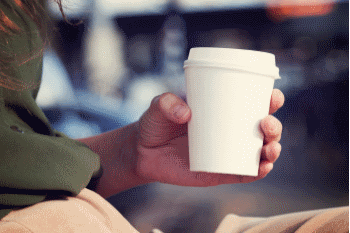The Green Coffee Cup: Britain Is Going To Cut Off The Disposable Cups
 According to a report published by the British parliamentary committee, in the UK at least 2,5 billion disposable coffee cups are thrown away per year, and just 0,25% can be recycled. The Environmental Audit Committee, appointed by the House of Commons, suggests a fee to around 10 percent on every cup of coffee sold (named “Latte levy”) for every disposable cup sold: “we […] recommend that the Government introduces a minimum 25p levy on disposable cups. The revenue should be used to invest in reprocessing facilities and “binfrastructure” to ensure that the remaining disposable cups are recycled”.
According to a report published by the British parliamentary committee, in the UK at least 2,5 billion disposable coffee cups are thrown away per year, and just 0,25% can be recycled. The Environmental Audit Committee, appointed by the House of Commons, suggests a fee to around 10 percent on every cup of coffee sold (named “Latte levy”) for every disposable cup sold: “we […] recommend that the Government introduces a minimum 25p levy on disposable cups. The revenue should be used to invest in reprocessing facilities and “binfrastructure” to ensure that the remaining disposable cups are recycled”.
The difficulty in recycling disposable coffee cups is their materials: “Disposable coffee cups are made from paper and lined with plastic, which makes them waterproof. This plastic lining cannot be removed by most recycling facilities. Once used, the paper part of the cup is usually contaminated by the cup’s contents.”. The report argues that the biggest problem with coffee cup waste is the lack of information about the recycle circle itself: most people seem to think that cups are widely recycled and are not aware of the multiple difficulties in recycling them. Most cups are in fact burned in incinerators and can cause damage to the planet itself, due to the toxins expelled after the burning process. The report inquiry is the result of several other measures which have taken place since September 2017 and aim to improve the production and recycling of coffee cups.
It seems that it is going to be more likely to be walking the streets of London and see people drinking coffee using their own personal, reusable, coffee cup, avoiding the so called “latte levy” and trying to reduce the environmental impact of disposable cup waste. Anyway, the Latte Levy alone won’t work, according to David Palmer-Jones, Chief Executive Officer of SUEZ recycling and recovery UK, it seems to be only the tip of the iceberg: Britain needs to invest more in the recycling industry and improve the packaging of everyday disposable items, reported by Independent.



